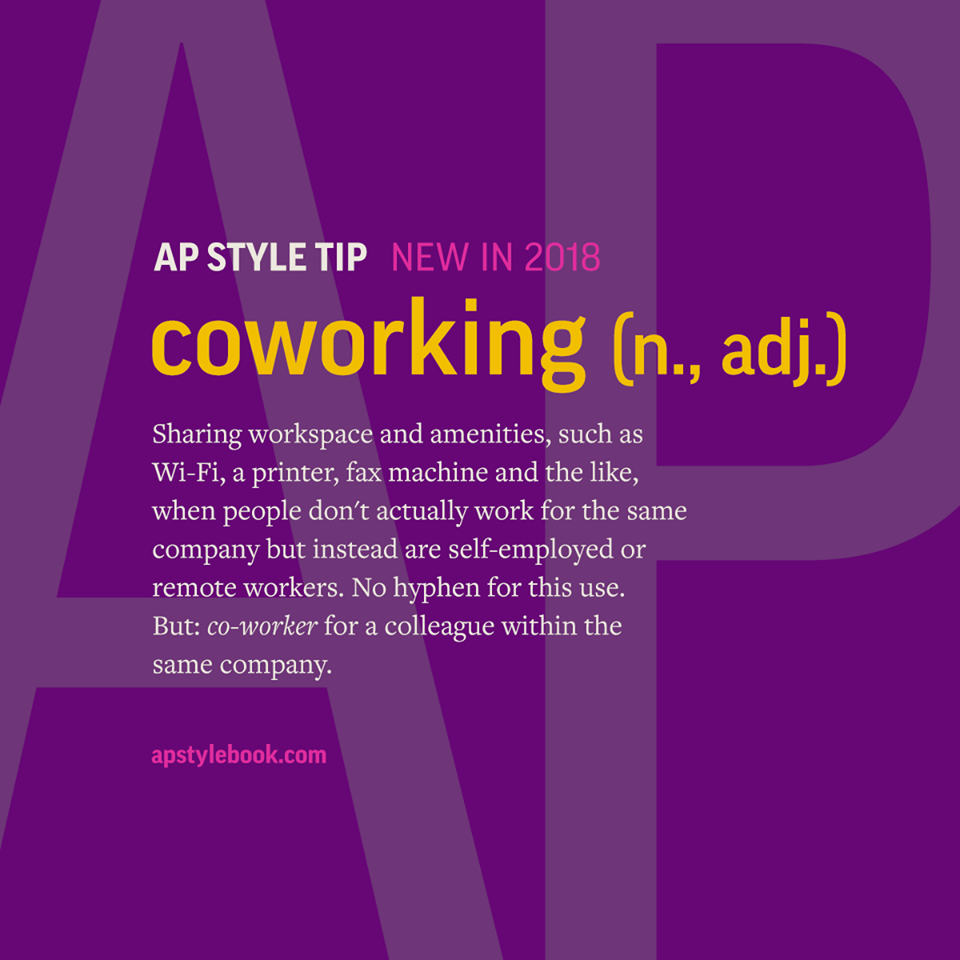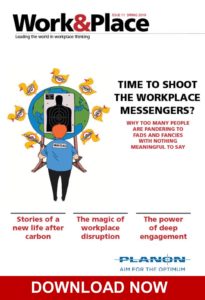- In May this year, the Associated Press Stylebook removed the hyphenated version of “co-working” and changed it to “coworking”.
- Industry leaders have been asking for this small, yet meaningful change for over a decade.
- The removal of the hyphen will help clear out the excessive and confusing industry terminology.
“Small distinctions may seem tedious, but they can have large ramifications”
Carsten Foertsch, founder of Deskmag, was spot-on when he penned those words in 2011.
The reason behind this statement is that Foertsch, along with many other figures from the coworking industry, have been campaigning to make a small yet simple change to the way coworking is referenced: drop the hyphen.
And this year, the industry got its wish. Or most of it.
In May 2018, the highly influential Associated Press Stylebook, which is widely used as a writing and editing reference for publishers worldwide, finally removed the hyphenated version of ‘co-working’ and changed to ‘coworking’ in its 2018 edition:

AP’s style Facebook announcement of the 2018 new coworking entry
Caption: AP’s style Facebook announcement of the 2018 new coworking entry
To some, it seems like a minute alteration. But just think of some other changes the AP Stylebook has made over the years:
- In 2011, e-mail changed to email
- In the same year, cell phone and smart phone changed to cellphone and smartphone
- In 2010, it changed ‘web site’ to ‘website’
Today, those original hyphenated terms look odd and antiquated. Reporters attending the AP Stylebook announcement in 2011 noted that “the use of ‘e-mail’ was seen as a relic of an earlier age, when the Internet was new to most people and the idea of ‘electronic mail’ was confusing.”
The same goes for coworking.
Coworking has become its own industry and it’s no longer “new to people”. We’ve seen huge global growth in flexible workspace to the extent where financial institutions are pouring billions of dollars into coworking, and commercial real estate firms are opening up collaborative spaces and investing in their own coworking centres.
WeWork alone is one of the most valuable venture-backed firms in the US and if nothing else, the fast-growing brand has added more fuel to the industry’s publicity machine than any other.
It’s easy to see why the change is happening now.
As for the AP’s announcement, the change flew largely under the radar until recently, when the news swept across its social media channels and caught the eye of the coworking industry. Coworking marketer Cat Johnson penned this insightful post, having polled numerous members of her Coworking Content Alliance for their thoughts on the matter.
And if you’re wondering how, or why, language tends to evolve from space-to-hyphen-to-nothing, the Stylebook’s explanation (as quoted in The Guardian) notes that “hyphens tend to clutter up text”, and there is a widespread trend in language to move through the hyphenated phase until the term in question becomes “accepted as one word”.
“Inventions, ideas and new concepts often begin life as two words, then become hyphenated, before finally becoming accepted as one word. Why wait? ‘Wire-less’ and ‘down-stairs’ were once hyphenated, and some old-fashioned souls still hyphenate e-mail.
“Words such as chatroom, frontbench, gameplan, housebuyer, standup and superinjunction are all one word in our publications, as are thinktank (not a tank that thinks), longlist (not necessarily a long list) and shortlist (which need not be short).”
Industry activists including Alex Hillman of Indy Hall (2008), Carsten Foertsch of Deskmag (2011), Ramon Suarez (2015), and many others, have been campaigning for this small, but significant change, for more than a decade.
And finally, the AP Stylebook has accepted that ‘co-working’ is now ‘coworking’.
It’s not the only influential media guide out there, and there’s still plenty of work to be done in order to get the message across. Just last week, TechCrunch reported on “co-working” brand Campfire’s $18million funding round. But the use of the hyphen is probably due to Campfire itself, as the brand utilises a mixture of “co-working” and “coworking” across its own website content.
Campfire isn’t the only brand using the hyphenated version, and of course personal choice has a part to play, too.
But our industry is already plagued by excessive, confusing terminology. So the AP’s decision to switch to ‘coworking’ acts as a milestone, and now we have an opportunity to introduce uniformity and to work with the media (and each other) to achieve greater consistency across our industry.
It’s coworking, not co-working.
Author: Jo Meunier (née Disney)
Originally Published on October 10, 2018 at 06:50AM
Article published originally via AllWork.Space https://allwork.space/2018/10/after-more-than-a-decade-co-working-is-now-officially-coworking/




